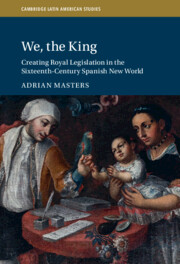‘Meticulously researched and beautifully written, We, the King unveils the labyrinthine petitioning process involved in enacting thousands of legislative decrees and reveals how diligent vassals shaped colonial policies and categories of difference. It dismantles the standard view of the Spanish colonial state as the architect of legal rule that was all-seeing and all-pervasive. This outstanding work should be required reading for all colonial Latin Americanists.’
Nancy E. van Deusen - author of Global Indos: The Indigenous Struggle for Justice in Sixteenth-Century Spain
‘Adrian Masters has produced an ambitious study of early modern bureaucracy, law-making, and subaltern agency. Deeply researched and carefully written, We, the King is an indispensable resource for scholars of the Iberian empire.’
Michelle McKinley - author of Fractional Freedoms: Slavery, Intimacy and Legal Mobilization in Colonial Lima, 1600–1700
‘In this tour de force analysis of lawmaking in the early modern Spanish empire, Adrian Masters reveals that not only were the king’s New World vassals co-creators of royal law, but most provocatively, that it was their petitions to the crown that helped codify the human differences that would inform the caste system.’
S. Elizabeth Penry - author of The People Are King: The Making of an Indigenous Andean Politics
‘Adrian Masters masterfully unpacks the powerful legal fiction of the King of Spain and Emperor of the Indies, demonstrating that the world’s first global empire was a contingent and collective enterprise made by paper-peddling brokers and subalterns. A must read for anyone interested in the early modern history of empires and governance.’
Mark Thurner - author of History's Peru: The Poetics of Colonial and Postcolonial Historiography
‘… this is a strong book with superb writing. While scholars generally know that princes of many European empires often merely accepted and pasted petitions of social groups and individuals into royal communications to change policy, Masters unearths and discusses many illustrative examples of this mechanism. By doing so, he successfully traces the intricate working of the imperial administration and details how social communities drummed up support to reverse discriminatory rulings against them.’
Christoph Rosenmüller
Source: American Historical Review



